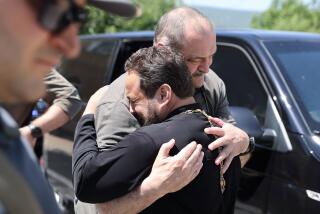Moscow bomber identified as teenage widow from Dagestan
- Share via
Reporting from Moscow — One of the suicide bombers who blew herself up aboard a crowded Moscow subway car this week was a teenager from the restive republic of Dagestan, Russian authorities said Friday.
The national counter-terrorism committee released only the name of the teen who set off her charge in Park Kultury Metro station as Dzhanet Abdurakhmanova, also given as Abdullayeva. But leaks from law enforcement sources filled out the sketch of the 17-year-old’s abbreviated, violent life: The girl was the widow of Dagestani militant leader Umalat Magomedov, who was killed by federal troops last year, a source told Interfax news agency.
Amid rising public outcry, infuriated officials are pushing hard for culprits to be punished for Monday’s twin blasts, which killed 40 people. Another double bombing in Dagestan two days later killed 12 people, most of them police officers.
Intelligence and other law enforcement groups have announced that they know who carried out both bombings. They have captured some of the accomplices and begun interrogations, officials say.
Although authorities said they were still trying to identify the second bomber in Monday’s attack, the Kommersant newspaper said she had been tentatively identified as Markha Ustarkhanova from Chechnya, the 20-year-old widow of a militant leader killed in October.
Other details continued to filter out. Investigators have found the apartment used by the bombers’ accomplices to prepare the explosives belts, an unnamed law enforcement source told Interfax. The source also said the belts were probably detonated by remote control.
President Dmitry Medvedev paid a visit to Dagestan after the second set of bombings. On Friday, he was back in Moscow, calling for militants to be run to ground, and for Russian lawmakers to consider whether the laws needed to get tougher.
“We need a model for terrorism crimes that ensures that anybody assisting [terrorists] -- no matter what they do, make their soup or wash their clothes -- will be seen as people committing a crime,” Medvedev said during a meeting with heads of the parliamentary factions. “Only that will give us hope to correctly prosecute them.”
Earlier in the week, Medvedev struck a slightly softer tone. He met with a human rights official and discussed the social and economic conditions driving extremism along Russia’s turbulent, mostly Muslim southern edge.
Since then, his rhetoric has been drifting more in the direction of his predecessor and mentor, hard-line Prime Minister Vladimir Putin.
“As far as militant nests are concerned, our police will remain the same,” Medvedev said Friday. “We will carry out operations and eliminate them without any hesitations.”
More to Read
Sign up for Essential California
The most important California stories and recommendations in your inbox every morning.
You may occasionally receive promotional content from the Los Angeles Times.










